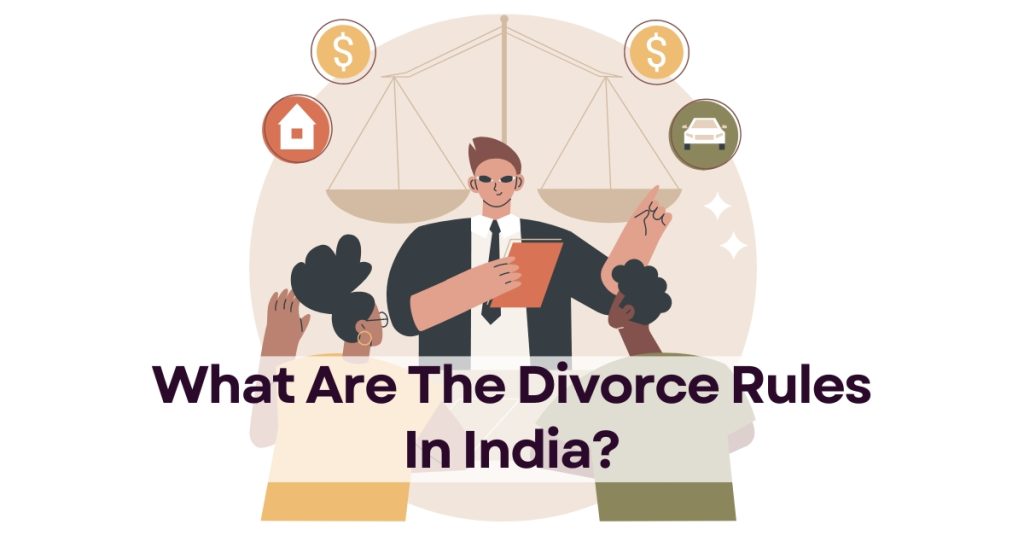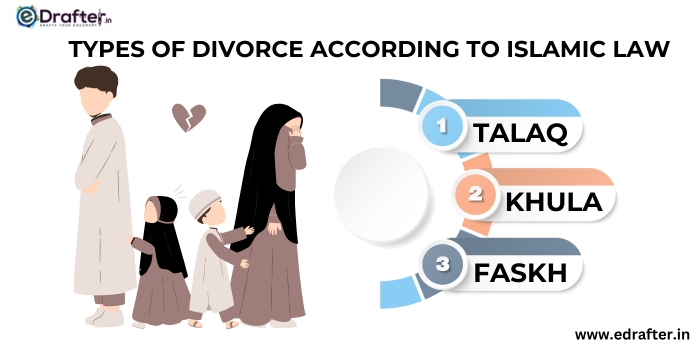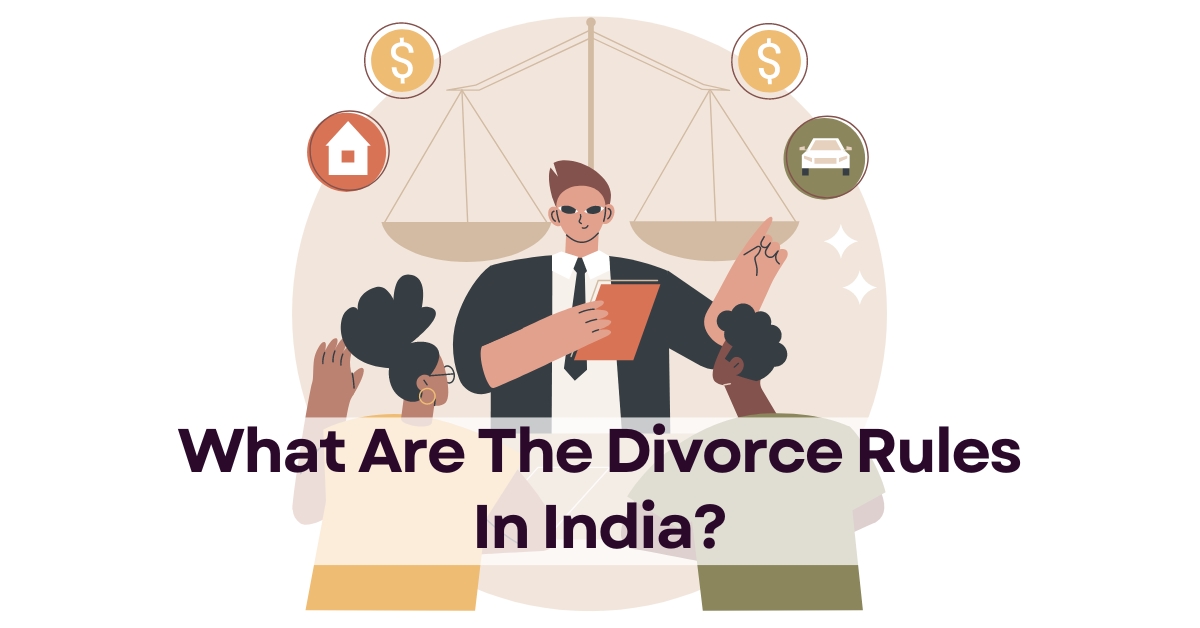
Table Of Content
- What Are The Rules For Divorce In India?
- What Are The Alimony Rules In India?
- What Are The Hindu Divorce Rules In India?
- What Are The Muslim Divorce Rules In India?
- Are There Any Divorce Rules For Schedule Tribes In India?
- Do Government Employees Have Any Divorce Rules In India?
- Conclusion
In India, a divorce is a legal way to end the marriage between the husband and wife due to their personal choice and other reasons. but the government made some laws for couples who are ending their marriage. In this Blog, We delve into what are the basic rules of divorce in India.
What Are The Rules For Divorce In India?
There are various acts which govern Divorce laws in India, these acts depend upon the religion of the couple involved. For Example-
- The Hindu Marriage Act, 1955– the Act states provisions of Divorce for Hindu, Sikh, Jain, and Buddhist Couples.
- The Muslim Personal Law (Shariat) Application Act, 1937– The Act states provisions of Divorce for Muslim Couples.
- The Indian Divorce Act, 1869 – The Act states provisions of Divorce for Christian couples.
What Are The Alimony Rules In India?
In India, alimony rules differ according to the particular cases and the given laws. Alimony, which is referred to as maintenance, can be given to either spouse based on factors such as financial need, earning capacity, length of marriage, and standard of living during the marriage. Under different laws:
- The Hindu Marriage Act, 1955: The sentence gives the right to a spouse to get alimony or maintenance which is usually determined by the factors like income, assets, and financial needs of the spouse.
- The Muslim Personal Law (Shariat) Application Act, 1937: The marriage contract includes the provision of the payment of the maintenance to the wife (called “Mahr” or “Meher”) as a condition. On the contrary, if the couple decides to divorce, the wife might be eligible for the maintenance referred to as “Mehr” or “Nafaqa”.
- The Indian Divorce Act, 1869: The arrangement affords the wife to get alimony or maintenance from the husband if his income is enough or if he fails to give her the maintenance she needs.
- Besides the laws and the court precedents also the cases other than the alimony determination take part in that.
Judges take into account many things when they calculate the alimony, and you should seek legal advice for your particular case.
What Are The Hindu Divorce Rules In India?
In India, Hindu divorce rules are mostly based on the Hindu Marriage Act, of 1955. The law stipulates that both spouses can ask for divorce on a list of grounds defined by law. These are the examples of the grounds that can be cited that can be the reason for the divorce and include examples like adultery, cruelty, desertion for two years, conversion to another religion, unsoundness of mind, and virulent and incurable leprosy. Besides, if a spouse has not been in touch with anyone for a long period of seven years or more, the other spouse can apply for divorce.
The procedure of the divorce under Hindu law consists of the submission of the petition in the district court where the couple last lived together or where the marital ceremony took place. Both parties get a chance to give their arguments and the proof of the claims they have made. If the court deems the reason for divorce as valid, it may issue a decree of divorce.
Nevertheless, divorce under Hindu law is not an automatic thing and it takes a long time for the legal procedure to be completed. The court could also try to soften the spouses relationship by counseling and mediation before allowing a divorce. In addition, the decree for alimony, child custody, and property division may be included, depending upon the case status.
What Are The Muslim Divorce Rules In India?
In India, Muslim divorce laws are based on the Muslim Personal Law (Shariat) Application Act, 1937. This law allows Muslim couples to go for divorce either by the judicial or the extra-judicial ways.
There are three main types of divorce recognized in Islamic law: There are three main types of divorce recognized in Islamic law:

- Talaq: Talaq is given as a unisional form of divorce by the husband when he pronounces the word “talaq” three times, either at once or during a period of time. Thus, the communication may be done orally, in writing, or through electronic communication. Nevertheless, some procedural requirements must be met for a valid talaq to be declared and, in addition, there are aids for reconciliation during the waiting period known as the iddah.
- Khula: Khula is a divorce that the wife starts on her own, when she wants to end the marriage by the way of mutual agreements or by giving the husband some type of compensation.
- Faskh: The Faskh is a judicial divorce which is granted by a Qazi (Islamic judge) or a Sharia court on certain causes like cruelty, desertion, being impotent, or the non-observance of the marital obligations.
Islamic divorce in India is a complicated process where they have to follow both the religious laws and the legal procedures. People who are into divorce under Islamic law ought to talk to religious scholars and legal experts and, thus, will be able to get their rights and obligations.
Are There Any Divorce Rules For Schedule Tribes In India?
Law is applicable to scheduled tribes in India who live in the same way as other communities in the country. There are none of the divorce rules that are meant exclusively for the scheduled tribes. Nevertheless, the divorce laws are the same for every single citizen of India, including the Scheduled tribes, and they are based on such factors as religion, personal laws, and the Indian legal system. Hence, the members of the scheduled tribes who are looking for a divorce are bound to follow the divorce laws that are applicable to their religion or personal laws, such as the Hindu Marriage Act, 1955, the Muslim Personal Law (Shariat) Application Act, 1937, or any other law of their faith and customs.
Do Government Employees Have Any Divorce Rules In India?
Government employees in India are under the same divorce laws as other people. There are no rules for divorce of government workers which are made specially for government employees. The procedure of divorce for government employees is regulated by the personal laws of their religion, in addition to the general civil laws, such as the Hindu Marriage Act, 1955, the Muslim Personal Law (Shariat) Application Act, 1937, or other laws that are applicable to them depending on their customs and traditions.
Nonetheless, government employees may face some of the administrative procedures connected with their employment status, like the marital status of the employees for benefits or entitlements, but these are not the ones specific to divorce. Finally, the way the divorce process for government employees is, like that of any other individual in India, and they will have to follow the legal requirements and procedures according to their personal circumstances and the laws that apply to them.
Conclusion
Comprehensive knowledge of the legal system, cultural differences, and personal consequences is essential for managing the complicated process of divorce in India. Everything from the reasons for divorce to issues with child custody and alimony has to be well thought out and followed by law. A new chapter of life can be created with greater awareness and empowerment when people are well-informed and seek the appropriate legal assistance to help them manage this difficult transition with clarity and confidence.


